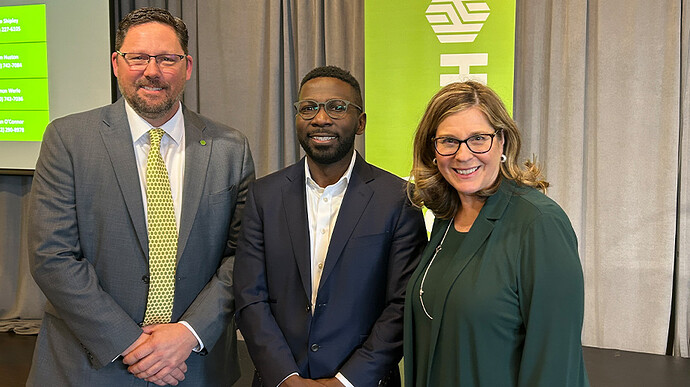POLAND, Ohio - With strong consumer spending and a strong dollar, the U.S. economy has persevered, but Olu Omondunbi, Huntington Private Bank chief economist, said there are some cracks starting to show in the healthy labor market.
During the Economic Outlook and Market Overview 2025 meeting Thursday at The Lake Club, Omondunbi spoke about both the positives and negatives in the national and regional economic picture, including what he called “the elephant in the room” - tariffs.
“In our view, the uncertainty around tariffs is worse than the tariffs themselves,” Omondunbi said.
While he sees some renegotiation of trade deals to reduce the trade deficit and proposed tax policies to reduce taxes and leave the Tax Cuts and Jobs Act in place as positives, Omondunbi said tariff and geopolitical uncertainty could increase inflation and erode consumer confidence over time.
Omondunbi said if the stock market slips 10% to 15%, it could also affect upper- and middle-income consumer spending.
“The sooner we get some clarity in terms of which of the tariffs are going to stick, the better it’s going to be for consumers and businesses,” Omondunbi said.
He sees the U.S. economy growing by 2% this year, which is slower than the 2.8% last year.
But the U.S. economy continues to have strong productivity growth - stronger than other countries - which has kept the U.S. dollar strong.
And while the federal funds rate remained unchanged when it was announced by the Federal Reserve this week, Omondunbi said the three-month and 10-year treasury yield bills have been gradually cut, which generally translates into lower mortgage rates.
Omondunbi reported strong productivity growth, including strong capital expenditures by businesses - especially for intellectual property and software, with advances in artificial intelligence.
He also noted there is a healthy labor market that added 2 million jobs in 2024, just down from 2.4 million in 2023.
“Historically, whenever the U.S. economy slips into recession, we see a big decline in employment,” Omondunbi said. “The labor markets are in good shape. Job gains are at about 200,000 over the past three months. Even more importantly, wage growth [outpaces] inflation. Consumer balance sheets are good. Household debt burdens are low. So we think recession risks are low as of March 2025.”
Nationally, unemployment has risen to 4.1% from 3.4% two years ago, which is still historically low, Omondunbi said. In 2022 there were two jobs for every unemployed person, but now the ratio is nearly 1 to 1.
“We’re about 7 million jobs above the pre-pandemic level,” Omondunbi said.
Although Ohio’s and Pennsylvania’s employment trends have risen slightly above pre-pandemic levels, employment in the Mahoning Valley has remained below pre-pandemic levels. Omondunbi blames, in part, weak population dynamics in these states and the local area, which has slowed job recovery.
While Washington, D.C., is feeling the impact of the Department of Government Efficiency, led by billionaire Elon Musk, the impact on the local job market is unclear at this time, Omondunbi said.
Inflation remains sticky in some parts of the economy. It peaked at about 8% in 2022 and is now at 2.6%, higher than the 2% goal of the Federal Open Market Committee. Omondunbi said there are concerns that consumer expectations of higher inflation could actually elevate it. Consumers might purchase items now to beat perceived higher interest rates down the road.
Some of the drivers of inflation, he said, have been housing and energy costs. Housing costs have been pushed by a shortage of housing, while energy increases are based on global factors.
Omondunbi pointed to good news reported by Bloomberg on Wednesday. The U.S. Department of the Interior and U.S. Department of Housing and Urban Development are partnering to build more housing on federal land, which could ease some housing demand.
Locally, projects to revitalize neighborhoods could have a similar effect.
Omondunbi said the Mahoning Valley has a “vibrancy,” and there have been many investments that should pay off.
“I actually feel very optimistic about this region,” Omondunbi said. “I think that the many folks in the economic development team, they’re doing lots of positive things in terms of attracting folks to the region, in terms of bringing folks to the region.”
Sam Huston, Huntington Bank market president, regional banking Mahoning Valley, said there have been some positive developments in the area, including efforts to attract new technology in energy and battery development by the Youngstown Business Incubator and Brite Energy Innovators. He also pointed to investments by Amazon, Clark Hill, Ursa Major, the Youngstown Air Reserve Station and the recently announced Aerospace and Defense Innovation Hub.
“Without many of these organizations focused and working together, much of this could not be accomplished,” Huston said, adding such efforts “will propel Youngstown forward for the next generation.”
Huston pointed to some of the challenges that remain for the Valley, including workforce development and housing, as well as some of the current economic uncertainty that could impact the area.
“I am confident that the business community here in the Mahoning Valley has the resilience and expertise to navigate these changes and continue driving a strong local economy,” Huston said.
[Collection]businessjournaldaily.com
